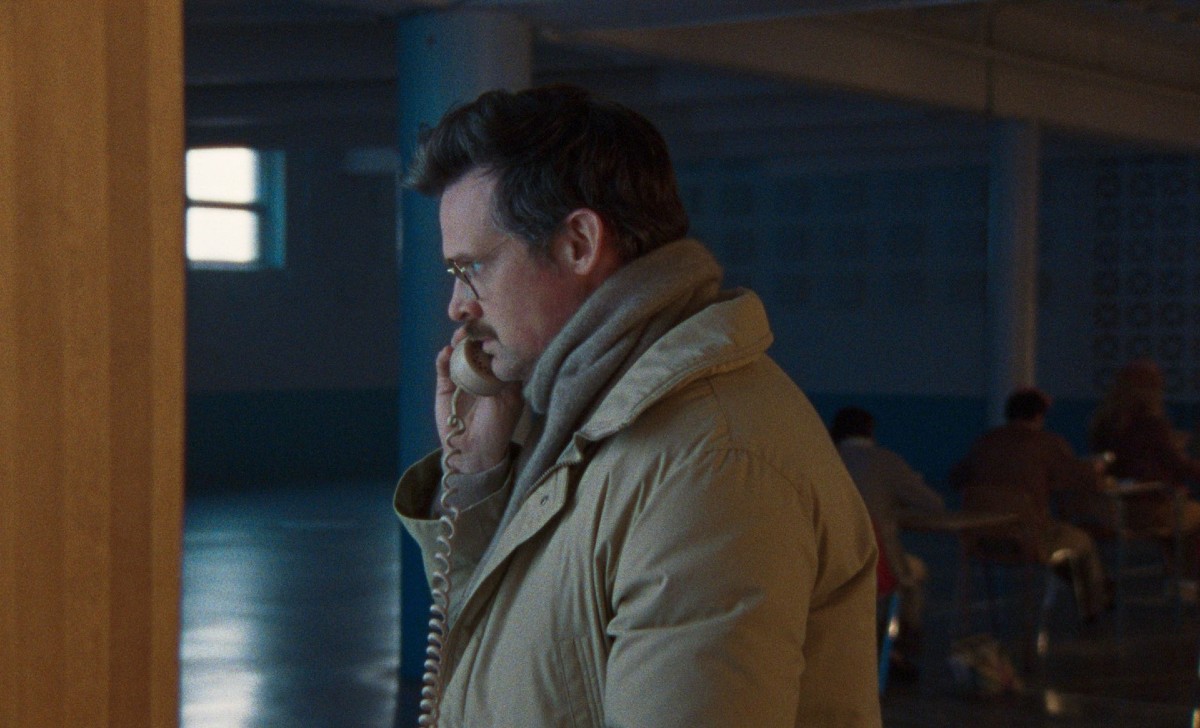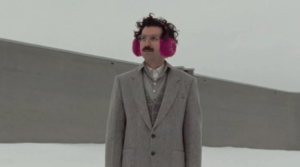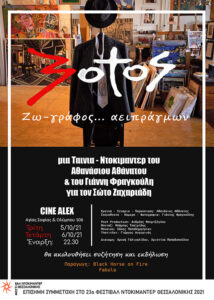UNIVERSAL LANGUAGE
Απρ 27, 2025 Κινηματογράφος 0

MOVIE REVIEW
THE INCOMPREHENSIBLE LANGUAGE
Universal language: by Giannis Fragoulis
We watched the film «Universal language» at the Athinaion Cinema, in Thessaloniki. A comedy that forces you to pay attention every minute to what is happening in the film text. One thing leads to another and, all together, they are absurdly logical. How is this possible? I will try in this text to explain it.
Universal language: The movie
In a mysterious, bizarre region, somewhere between Tehran and Winnipeg, the lives of various characters become intertwined in strange and unpredictable ways. Schoolgirls Negin and Nazgol discover money buried under the ice and decide to make it their own. At the same time, Massoud leads a group of tourists who seem increasingly confused as they tour the sights of Winnipeg. Meanwhile, Matthew decides to quit his monotonous job at a Quebec government agency and embarks on an enigmatic journey to find his mother.
Space, time and identities intertwine, interact and coalesce, creating a surreal comedy full of misunderstandings and repeated twists and turns. Still, a teacher lashes out, out of nowhere, at his students. Two girls are determined to help a friend at all costs to get back the glasses a turkey stole from him. A man who has lost his identity. A tour guide who really doesn’t have much to say. These are the characters and it is their words that take center stage.
Universal language: What does speech mean
What is language? Is it the means by which we communicate the meanings we are going to express? And what is meaning? Does meaning only have meaning? Questions that some have meaning and some don’t. Especially the last one. But how would you feel if we said that language is also an aesthetic phenomenon? If one reflects along these lines then something begins to unravel, like a tangle leading a modern-day Theseus to the core of the issue at hand.
In other words, speech is expressed by people to communicate a meaning to someone or some others. However, most of the time, we do not, in fact, want to communicate something, but to say our thoughts out loud. To monologue so that it doesn’t appear that we are monologuing. In this modern Babel, everyone seems to accept the other person’s word, respect it, but don’t «bother» to understand it.

Universal language: The absurd
In Winnipeg it is not possible to have such a large Persian community so that iranian is spoken by many, signs are in Iranian and tours are given in that language. What the film shows us is strange and, ultimately, absurd. Logic is an act and a process that makes sense when it is expressed, in the way it is expressed, by the person proposing a reading.
The recipient of this message finds it difficult to accept something foreign to his or her cultural realm. The politeness demanded by Western society – and rightly so – forces him to take the time necessary to understand what has been said. If this is understood, then we will understand who he is speaking and what his place in society is. These are what is required if we are to be able to have the necessary coherence in the society we live in. In this sense, the logical and the irrational change positions and we can now accept the irrational as a strangely logical reason.
Universal language: The discourse
The director puts chunks of discourse that make sense into a small and hermetically sealed narrative space. This space is the projection of ourselves, so it is pieces of our ego that are put in as discourse and, more importantly, as fragments of an image that is the society in which we live. If it is strange to hear almost only farsi in Winnipeg, it is equally strange to hear english speech, in this state of Canada, when it is not understood. This is because the other person is something strange to us since in him we make the projection of the Other, according to Lacan, who does seem strange to us since he is our distorted ego, something we hardly recognize as our own.

That is the «point» of this film. Speech has a meaning but it is lost in the indeterminacy of the speech of our distorted ego. This is not the first film to attempt this narrative. Cinema is full of such narratives, only, most of them, accept the structured discourse that dominates society and there they show the absurd. But in Jim Jarmusch’s film, «Ghost dog: the way of the samurai» (1999) we had a similar narrative in an almost similar way.
Universal language: The final reading
At the end of film we have to ask ourselves about our communication with other people, about how we communicate, why we want to communicate, whether it is a vital need for us. The viewer, after the film is over, is left frozen. Okay, what is he trying to tell us, he thinks. Then he reconstructs her text and begins to make the connections to arrive at his own final reading, as I did, in this review. That’s the only way the film works as a narrative.
UNIVERSAL LANGUAGE
Directed by Matthew Rankin
Written by Matthew Rankin, Ila Firouzabadi, Pirouz Nemati
Photography by Isabelle Stachtchenko
Editing by Xi Feng
Music by Amir Amiri, Christophe Lamarche-Ledoux
Sound by Armin Firouzabadi, Bernard Gariépy Strobl, Sacha Ratcliffe, Pablo Villegas
Art Direction: Chad Giesbrecht, Roger Martin
Costumes: Negar Nemati
Producers: Sylvain Corbeil
Cast: Matthew Rankin (Matthew), Pirouz Nemati (Massoud), Amir Amiri (musician), Faraz Anoushah Pour (tourist), Bernard Arene (pharmacist), Baharan BaniAhmadi (Mrs. Zardooz), Rojina Esmaeili (Negin)
Country of production: Canada
Year of production: 2024
Color: Color
Language: persian (farsi), french
Genre: comedy, satire
Duration: 89΄
Distribution company: Weird Wave
For more information on the actors and technical characteristics see here.
Read the reviews we have published
Σχετικά άρθρα
-
 IL VANGELO SECONDO MATTEO
IL VANGELO SECONDO MATTEOΑπρ 23, 2025 0
-

-
 THE RETURN OF IVAN
THE RETURN OF IVANΑπρ 15, 2025 0
-

Στην ίδια κατηγορία
-
 Η συνομιλία
Η συνομιλίαΑπρ 25, 2025 0
-
 ΟΙΚΟΥΜΕΝΙΚΗ ΓΛΩΣΣΑ
ΟΙΚΟΥΜΕΝΙΚΗ ΓΛΩΣΣΑΑπρ 23, 2025 0
-
 ΤΟ ΚΑΤΑ ΜΑΤΘΑΙΟΝ...
ΤΟ ΚΑΤΑ ΜΑΤΘΑΙΟΝ...Απρ 22, 2025 0
-
 01 ΝΑΝΟΣ ΒΑΛΑΩΡΙΤΗΣ...
01 ΝΑΝΟΣ ΒΑΛΑΩΡΙΤΗΣ...Απρ 18, 2025 0
Αναζήτηση
-
 WONDER WOMAN
WONDER WOMANΙούν 09, 2017 138
-
 ΠΑΙΔΙΚΗ ΣΚΗΝΗ
ΠΑΙΔΙΚΗ ΣΚΗΝΗΟκτ 12, 2014 2
-
 ΚΛΗΡΩΣΗ ΠΡΟΣΚΛΗΣΕΩΝ
ΚΛΗΡΩΣΗ ΠΡΟΣΚΛΗΣΕΩΝΜαρ 22, 2014 2
-
 ΔΥΟ ΜΕΡΕΣ, ΜΙΑ ΝΥΧΤΑ
ΔΥΟ ΜΕΡΕΣ, ΜΙΑ ΝΥΧΤΑΝοέ 13, 2014 2
-
 ΑΧΙΛΛΕΑΣ ΨΑΛΤΟΠΟΥΛΟΣ
ΑΧΙΛΛΕΑΣ ΨΑΛΤΟΠΟΥΛΟΣΝοέ 09, 2014 2
-
 ISTABUL FILM FESTIVAL
ISTABUL FILM FESTIVALΜαρ 08, 2014 2
-
 UNIVERSAL LANGUAGE
UNIVERSAL LANGUAGEΑπρ 27, 2025 0
-
 Η συνομιλία
Η συνομιλίαΑπρ 25, 2025 0
-
 IL VANGELO SECONDO MATTEO
IL VANGELO SECONDO MATTEOΑπρ 23, 2025 0
-
 ΟΙΚΟΥΜΕΝΙΚΗ ΓΛΩΣΣΑ
ΟΙΚΟΥΜΕΝΙΚΗ ΓΛΩΣΣΑΑπρ 23, 2025 0
-
 ΤΟ ΚΑΤΑ ΜΑΤΘΑΙΟΝ ΕΥΑΓΓΕΛΙΟ
ΤΟ ΚΑΤΑ ΜΑΤΘΑΙΟΝ ΕΥΑΓΓΕΛΙΟΑπρ 22, 2025 0
-


Δείτε το τρέιλερ της ταινίας μας, που συμμετέχει το Φεστιβάλ Ντοκιμαντέρ Θεσσαλονίκης.
SOTOS, EVERLASTING PAINTER (TRAILER)
Youtube
Επικοινωνήστε
ΓΙΑΝΝΗΣ ΦΡΑΓΚΟΥΛΗΣ
Email: info@filmandtheater.gr
Τηλ: (+30) 6974123481
Διεύθυνση: Ιωαννίνων 2, 56430, Σταυρούπολη Θεσσαλονίκη
![]()

